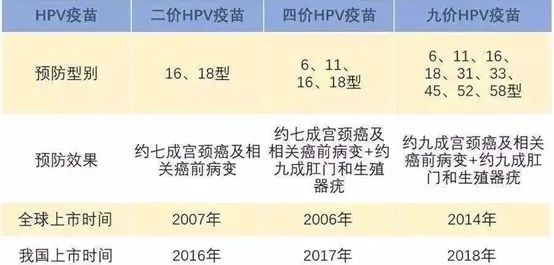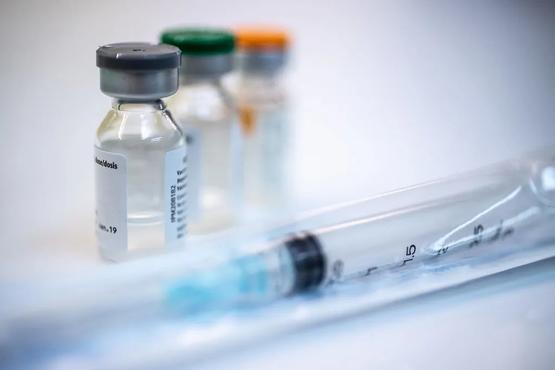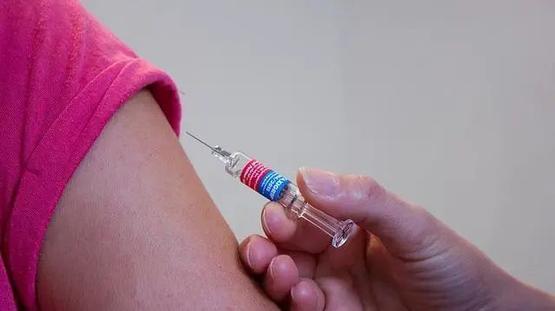On August 30, the nine-valent HPV vaccine was approved by the State Food and Drug Administration, expanding the applicable population from women aged 16 to 26 to women aged 9 to 45.
The HPV vaccine is currently available in three types: bivalent, quadrivalent and nine-valent. This adjustment allows more people to have the opportunity to receive the nine-valent vaccine. In recent years, the approval of domestic HPV vaccines has also increased vaccine supply and lowered prices.
More people can get the HPV vaccine, and more questions about the type of vaccine and when to get it. Here are answers to some of the most common questions:
Is HPV really dangerous?
Do you have to be vaccinated?
The full name of HPV is human papillomavirus, and this virus is mainly spread through sexual activity or skin and mucous membrane contact with an infected person. Proper use of condoms can help prevent the spread of HPV, but not completely. Most people get HPV shortly after sex begins.
About 200 HPV types are known, and although not all of them are pathogenic, at least 14 of them can cause cancer. Research suggests that although most HPV infections go away on their own, more than 95% of cervical cancers are associated with persistent infection with high-risk HPV types.
Cervical cancer is the fourth most common cancer among women in the world, and its incidence is second only to breast cancer among female malignant tumors in China . According to the World Health Organization (WHO), there will be approximately 600,000 new cases of cervical cancer and 340,000 deaths worldwide in 2020. Therefore, the World Health Organization recommends the rational use of vaccines that protect against HPV.
In addition to cervical cancer, different types of HPV infection are also associated with cancers in the head, neck, anus and other parts (HPV16, 18, 31, 45, 52, 58, etc.), and can cause genital and perianal condyloma acuminatum (HPV6, 11, etc.) , is also related to common warts, flat warts, plantar warts and other diseases (HPV1, 2, 3, etc.).
What’s the difference between the several HPV vaccines?
Do I need to hit the other after hitting one?
The different “prices” of HPV vaccines can be simply understood as how many genotypes of viruses this vaccine can fight against. For example, bivalent vaccines are aimed at two genotypes of HPV16 and HPV18 viruses. In theory, the nine-valent vaccine will have a wider range of protection due to the many genotypes it fights against.

A brief comparison of bivalent, quadrivalent and ninevalent HPV vaccines丨Shanghai Municipal Health Commission
Is that the effect of bivalent and quadrivalent vaccines is much worse? no. Since two high-risk genotypes of HPV16 and 18 are associated with about 70% of cervical cancers, vaccination with bivalent vaccine can theoretically prevent 70% of cervical cancers and precancerous lesions . In addition to this, the quadrivalent vaccine can prevent 90% of genital warts.
For those who have been vaccinated with bivalent or quadrivalent vaccines, if conditions permit, it is also possible to vaccinate the 9-valent vaccine for better protection, but it is recommended to vaccinate again at an interval of more than 12 months. If you are in the period of vaccination, it is not recommended to change the type of vaccine in the middle of vaccination.
What is the appropriate age for the 3 vaccines?
How is age determined?
After this adjustment, the approved age ranges for the three vaccines in mainland China are: bivalent 9-45 years old, quadrivalent 20-45 years old, and 9-valent 9-45 years old . If it is not within the recommended age range, the vaccination institution will not vaccinate (the age of the first and last doses cannot exceed the range).
But in theory and reality, vaccination for women over the recommended age is still protective, and it makes more sense for women who are over the recommended age but not yet sexually active.
So many people asked, how is the age of vaccination determined? Why are there sometimes differences between Mainland China and other countries and regions?
In fact, vaccines are a special kind of medicine, and there are strict systems and procedures in management. It is also crucial to ensure safety while exerting their maximum effect. According to the current “Administrative Measures for Drug Registration”, clinical trials must be carried out before imported vaccines are approved for marketing in China.
Therefore, the vaccine has such an age limit, largely because the safety and efficacy reports of other age groups of the local population are not perfect. In other words, even if it is still useful beyond the recommended age, more research and data are needed to support this result.
The approval by the State Food and Drug Administration to expand the applicable age range is also supported by more research data. In the future, researchers will still actively collect data and strive to allow more people to benefit from the HPV vaccine.
How to choose the right vaccine for you?
It is recommended to choose which vaccine to vaccinate according to your age, the protective effect you seek, economic situation and local vaccine supply.
Among the three vaccines, the bivalent vaccine can protect against the two HPV genotypes most closely related to cervical cancer, but the nine-valent vaccine has a wider range of protection. If the age is appropriate and the financial situation allows, you can choose to receive the nine-valent vaccine. But if the conditions do not allow, it is better to play the second price or the fourth price first.
In addition, the vaccine also has an optimal age for vaccination. Considering that once you have sex, the risk of contracting HPV is high, and it takes time for your body to reach the optimal level of antibodies after vaccination, so the best time for all three vaccines should be before the first sex. 1 year. Of course, this is the best age for vaccination, which does not mean that it is useless if it is not vaccinated at this time.

Figure | flickr
Where can I get vaccinated?
How to make an appointment?
Vaccinations are mainly carried out in community hospitals and community health service centers, which are usually children’s immunization clinics.
Since the main responsibility of community hospitals and community health service centers is the task of childhood immunization planning, and HPV vaccines are voluntarily vaccinated at their own expense in many places (free vaccination for certain groups of people in some areas), not all community hospitals and community health service centers are HPV vaccines must be purchased and vaccination services provided. At this point, you can ask more about community hospitals and community health service centers. In addition, you can also pay attention to whether there are adult vaccination clinics in the province or city to provide vaccination services.
If necessary, in most places, you can call the 12320 health hotline in most places to inquire about the latest news, or you can inquire on the local appointment registration platform. If the local CDC and health department have platforms such as public accounts, you can also follow Learn about it.
Do I have to be tested before getting vaccinated?
Do I need to get vaccinated if I have HPV?
Some vaccination agencies offer HPV testing and TCT testing. But in fact, it is not necessary to do an HPV test before getting the HPV vaccine , because even people of the right age who test positive for HPV should still get the HPV vaccine because it can help protect against other strains that are not yet infected. However, the vaccine itself cannot treat existing HPV infections.
Post-treatment vaccination is recommended even if there has been a history of cervical lesions and genital warts. After HPV infection or the resulting cervical lesions has been cured, HPV vaccination can reduce the recurrence rate of the disease.
Do vaccines have a duration of protection?
What if I don’t get vaccinated on time?
Regarding the duration of protection after vaccination, it is known that antibodies can protect for at least 10 years after vaccination with bivalent and quadrivalent vaccines. Due to the late launch of the nine-valent vaccine, the observation time is still relatively short, but the existing data show that the antibody can protect at least 5 years, and the data model shows that the protection period may reach more than 50 years, which requires further actual data to confirm.
If you have been vaccinated with the first dose of the vaccine and the second dose is not given on time due to various reasons, you only need to make up the unvaccinated doses. It is recommended to complete all the vaccinations within one year.

Figure |
Can I fight during pregnancy, pregnancy and breastfeeding?
Due to insufficient research, the HPV vaccine is not currently recommended for pregnant women. If an unplanned pregnancy occurs during the vaccination period, there is no need to terminate the pregnancy, as long as the unvaccinated doses are postponed until after delivery.
For women who are trying to conceive, it is recommended to wait until the end of pregnancy before getting vaccinated. Current data do not identify vaccine-related adverse outcomes in women who conceived unintendedly during vaccination.
With regard to breastfeeding women, different agencies have different views. The World Health Organization (WHO) believes that although breastfeeding is not a contraindication to HPV vaccination, safety data are still limited, and vaccination during breastfeeding should be cautious. The American College of Obstetricians and Gynecologists has a more positive view, arguing that breastfeeding women who have not previously received the HPV vaccine can and should be vaccinated. The HPV vaccine is not recommended for breastfeeding women in my country for the time being.
Do men need the HPV vaccine?
Currently, the three vaccines are not approved for male vaccination in mainland my country. The bivalent vaccine is against cervical cancer caused by HPV16 and HPV18, and although men may also carry these two viruses, they are not pathogenic in men. Men can choose to use condoms to try to avoid spreading both subtypes of the virus to their partners.
However, male vaccination with quadrivalent and nine-valent HPV vaccines still has a certain positive significance. If they really want and have the conditions, men can be directly vaccinated with quadrivalent or nine-valent vaccines. Both work the same in preventing genital warts. If men are vaccinated to protect women and don’t care about the price, it makes more sense to get the nine-valent vaccine, which can better protect not only their own but also their sexual partners.
What are the common side effects of the HPV vaccine?
Adverse reactions to the HPV vaccine are usually mild and short-lived . The most common adverse reactions are local pain, redness and swelling. The local reaction of the 9-valent vaccine is more common than that of the tetravalent. It can be said that most people who receive the 9-valent vaccine will have local symptoms.
As for systemic adverse reactions, fever was the most common, followed by headache, nausea and fatigue. However, most people’s symptoms of adverse reactions do not last for more than 4 to 5 days, and no special treatment is required. However, other serious adverse reactions such as neurological complications and vascular embolism that have been reported have not been confirmed by the World Health Organization.
Some studies followed vaccinated populations for 8 years and found no long-term adverse effects of the HPV vaccine.
Syncope has been reported among adolescent females vaccinated, so be sure to sit still for more than 15 minutes after vaccination before leaving the vaccination site. If you have an allergic reaction after a vaccination or if you know you are allergic to something in the vaccine, you should avoid it.
Are vaccines safe?
First of all, the three vaccines use recombinant DNA technology and do not contain live virus components, so there is no infectivity.
There are often rumors about the health risks of the HPV vaccine, claiming that a large number of victims suffer from serious consequences such as “blocked blood vessels”, “epilepsy” and “pregnant women miscarriage” after being vaccinated. But in fact, so far, there has been no evidence of an increased risk of serious adverse outcomes from the HPV vaccine.
After HPV vaccination, cases of adverse events did occur, and deaths were also reported. But these are individual cases, and there are many confounding factors such as drug abuse, infection, underlying diseases, etc. in these cases, so the claim that vaccines are dangerous is unfounded.
The HPV vaccine has been marketed in many countries around the world, and many countries have incorporated it into their national immunization plans. Numerous international clinical trials have evaluated the effectiveness, safety and protection period of HPV vaccines, and it is generally believed that HPV vaccines are safe and effective.
What should I do if I can’t get vaccinated when I’m too old?
Can vaccines replace cervical cancer screening?
If there are female elders over 45 years old in the family, and the three vaccines are over the recommended age and cannot be vaccinated, is it impossible to prevent cervical cancer?
In fact, even with the HPV vaccine, it cannot be said that cervical cancer is 100% protected, because several current vaccines do not contain all the genotypes of the virus that can cause cervical cancer. So even if you have been vaccinated, don’t take it lightly. You still need to maintain a good lifestyle, take safety measures, and get cervical cancer screening on time . The commonly used screening methods in China are mainly liquid-based thin-layer cytometry (TCT testing), and HPV testing can also be done to check whether high-risk viruses are infected.
This is even more important for older women who cannot be vaccinated. Regular screening allows precancerous lesions to be detected at a more treatable stage, thereby reducing the harm of the disease.
references
[1] Vaccine and Immunization Branch of Chinese Preventive Medicine Association. Expert consensus on immune prevention of human papillomavirus-related diseases such as cervical cancer. Chinese Journal of Preventive Medicine. 2019;53(8):761-803.
[2] https://ift.tt/hDKc15H
[3] Shanghai Municipal Health Commission. How to choose bivalent, quadrivalent, and ninevalent HPV vaccines?
Authors: Li Tongzeng, Knock on the Rain, Vermicelli Er, Yu Zaizao, Li Xiaoqiu
Edit: transparent
Source of the title map: Figure Worm Creative
This article is from Nutshell and may not be reproduced without authorization.
If necessary, please contact [email protected]

This article is reproduced from: http://www.guokr.com/article/462117/
This site is for inclusion only, and the copyright belongs to the original author.